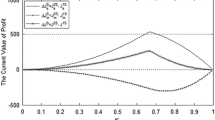Abstract
In a one-manufacturer-one-retailer supply chain, players establish both operations and marketing strategies and coordinate the chain through the implementation of a support program. A retailer, who sets both the pricing and the advertising strategies, acts as chain leader and decides whether to support a manufacturer’s operational strategy, such as quality improvements. The players share the overall chain revenues based on an exogenous, fixed sharing agreement. We compared coordinated and non-coordinated solutions in which coordination is carried out via a support program for quality improvements. While according to the literature a retailer–leader always has an economic preference for operation-based coordination, our findings reveal that: (a) low operational efficiency and effectiveness discourage the retailer’s interest in coordination and (b) good sharing parameter values overcome concerns regarding operational inefficiency but not those of operational ineffectiveness.
Access this chapter
Tax calculation will be finalised at checkout
Purchases are for personal use only
Similar content being viewed by others
References
Almeder C, Preusser M, Hartl R (2009) Simulation and optimization of supply chains: alternative or complementary approaches? OR Spectr 31(1):95–119
Cachon G (2003) Supply chain coordination with contracts. In: Graves S, de Kok T (eds) Handbooks in operations research and management science: Supply chain management. North-Holland, Amsterdam
Chand S, Moskowitz H, Novak A, Rekhi I, Sorger G (1996) Capacity allocation for dynamic process improvement with quality and demand considerations. Oper Res 44(6):964–976
Chintagunta P, Jain D (1992) A dynamic model of channel member strategies for marketing expenditures. Mark Sci 11:168–188
De Giovanni P (2011a) Environmental collaboration in a closed loop supply chain with a reverse revenue sharing contract. Ann Oper Res Online First Articles:23 pages. doi:10.1007/s10479-011-0912-5
De Giovanni P (2011b) Quality improvements vs. advertising support: Which strategy works better for a manufacturer? Eur J Oper Res 208(2):119–130
De Giovanni P, Roselli M (2012) Overcoming the drawbacks of a revenue sharing contract through a support program. Ann Oper Res 196:201–222
De Giovanni P, Zaccour G (2013) Cost-revenue sharing contract in closed-loop supply chains. In: Cardaliaguet P, Cressman R (eds) Advances in dynamic games. Annals of the international society of dynamic games, vol 12. Birkhäuser, Boston, pp 395–421
Dockner E, Jørgensen S, Long N, Sorger G (2000) Differential games in economics and management science. Cambridge University Press, Cambridge
Doganoglu T, Klapper D (2006) Goodwill and dynamic advertising strategies. Quant Market Econ 4:5–29
El Ouardighi F, Kim B (2010) Supply quality management with wholesale price and revenue-sharing contracts under horizontal competition. Eur J Oper Res 206:329–340
El Ouardighi F, Jørgensen S, Pasin F (2008) A dynamic game of operations and marketing management in a supply chain. Int J Game Theory Rev 34:59–77
Erickson G (2011) A differential game model of the marketing-operations interface. Eur J Oper Res 211(2):394–402
Fine C (1986) Quality improvements and learning in productive systems. Manag Sci 10:1301–1315
Fine C (1988) A quality control model with learning effects. Oper Res 36:437–444
He X, Prasad A, Sethi S, Gutierrez G (2007) A survey of Stackelberg differential game models in supply and marketing channels. J Syst Sci Syst Eng 16:385–413
He X, Prasad A, Sethi S (2009) Coordinated advertising and pricing in a dynamic stochastic supply chain: Feedback Stackelberg strategies. Prod Oper Manag 18:78–94
Jørgensen S (1986) Optimal production, purchasing and pricing: A differential game approach. Eur J Oper Res 24:64–76
Jørgensen S, Zaccour G (2003) A differential game of retailer promotions. Automatica 39: 1145–1155
Jørgensen S, Sigué S, Zaccour G (2000) Dynamic coordinated advertising in a channel. J Retailing 76:71–92
Jørgensen S, Sigué S, Zaccour G (2001) Stackelberg leadership in a marketing channel. Int Game Theory Rev 3:13–26
Jørgensen S, Taboubi S, Zaccour G (2003) Retail promotions with negative brand image effects: Is cooperation possible? Eur J Oper Res 150:395–405
Jørgensen S, Taboubi S, Zaccour G (2006) Incentives for retailer promotion in a marketing channel. In: Annals of the International Society of Dynamic Games, vol 8. Birkhäuser, Boston, pp 365–378
Karray S, Zaccour G (2006) Could co-op advertising be a manufacturer’s counterstrategy to store brands? J Bus Res 59:1008–1015
Kim B (1998) Optimal development of production technology when autonomous and induced learning are present. Int J Prod Econ 55:39–52
Kim B (2003) Dynamic outsourcing to contract manufacturers with different capabilities of reducing the supply cost. Int J Prod Econ 86:63–80
von Lanzenauer C, Pilz-Glombik K (2002) Coordinating supply chain decisions: An optimization model. OR Spectr 24(1):59–78
Martín-Herrán G, Taboubi S, Zaccour G (2012) Dual role of price and myopia in a marketing channel. Eur J Oper Res 219:284–295
Mentzer J, de Witt W, Keebler J, Min S, Nix N, Smith C, Zacham Z (2001) Defining supply chain management. J Bus Logist 22(2):1–25
Nair A, Narasimhan N (2006) Dynamics of competing with quality- and advertising-based goodwill. Eur J Oper Res 175:462–474
Rao A, Qul L, Ruekert R (1999) Signalling unobservable product quality through a brand ally. J Mark Res 36:258–268
Roselli M, De Giovanni P (2012) Recent developments in the differential equations of design and conformance quality. Int J Decis Sci Risk Manag 4(1–2):163–174
Tapiero C (1987) Production learning and quality control. IIE Trans 19(4):362–370
Vörös J (2006) The dynamics of price, quality and productivity improvement decisions. Eur J Oper Res 170:809–823
Author information
Authors and Affiliations
Corresponding author
Editor information
Editors and Affiliations
Rights and permissions
Copyright information
© 2013 Springer International Publishing Switzerland
About this chapter
Cite this chapter
De Giovanni, P. (2013). Should a Retailer Support a Quality Improvements Strategy?. In: Křivan, V., Zaccour, G. (eds) Advances in Dynamic Games. Annals of the International Society of Dynamic Games, vol 13. Birkhäuser, Cham. https://doi.org/10.1007/978-3-319-02690-9_7
Download citation
DOI: https://doi.org/10.1007/978-3-319-02690-9_7
Published:
Publisher Name: Birkhäuser, Cham
Print ISBN: 978-3-319-02689-3
Online ISBN: 978-3-319-02690-9
eBook Packages: Mathematics and StatisticsMathematics and Statistics (R0)




